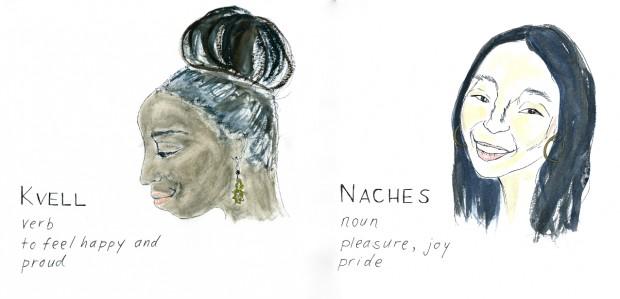The Globalization of Yiddish
Julia Simon painted some of her favorite Yiddish words, using friends and strangers as models, at a Mexican restaurant in Los Angeles.
It started in Nairobi when I was talking to some Kenyan friends including Handerson Mwandembo.
Now Handerson doesn’t speak Yiddish, and yet I couldn’t help but notice that sprinkled into his conversation were certain Yiddish words. Words like “schmooze.” I asked him how he would use “schmooze” in a sentence. Handerson gives an example, “He passes exams because he occasionally schmoozed his lecturers.”
And then there was my friend Reham Hussein who also uses Yiddish words. But Reham doesn’t live in Kenya. She lives in Cairo, Egypt.
Reham says she often uses the word “schmuck” (which, in its original meaning, is not the most polite word but it’s commonly used these days). For example: “Okay, you had a problem with a taxi driver today, oh what a schmuck he’s being,” she says. “More or less like a person who doesn’t know what they were doing and they just keep going. Annoying in a certain way.”
I learned these same Yiddish words from my grandmother who grew up in a Jewish part of Melbourne Australia and my grandfather who learned Yiddish from his Brooklyn parents. But where did Reham pick it up?
“I was introduced to it by American media more than anything else.” Reham says On the NBC TV show Friends, she says, they use a lot of Yiddish. “And in Seinfeld they use it, even more than in Friends.”
American pop culture has long been full of Yiddish words. There’s Mel Brooks, of course. In this scene from “Spaceballs” he uses the Yiddish word “bubkes”.
And then there are Americans with no ancestral connection to Yiddish, like singer Barry White. In his famous song “Never Going to Give you up” he uses the word “schtick”.
More recently, rapper Jay Electronica used the word “schmuck” in a song.
Jan Schwartz is a professor of Yiddish at Lund University in Sweden. He says the widespread use of Yiddish in American culture tells us something. “It’s a great example of how the Jewish acculturation in America has been very successful,” he says. “Jews are comfortable in America, they can express their Jewishness publicly it’s not something you have to hide.”
Schwartz says these Yiddish words entered American English through the European Jewish immigrants who arrived in the US in the late 19th and early 20th century. But Schwarz says it’s not just American English getting the Yiddish treatment. He says there are a good amount of Yiddish words in Dutch too. Yiddish speaking Jews have lived in the Netherlands for hundreds of years.
So I called up some friends in the Hague, Meline Arakelian and Yannick Dierart, and I tried a little experiment with them. I gave them a few Yiddish words and asked if they knew the meanings. “Mazzel”, “Meshuganah”… sure enough they knew them from Dutch.
Meline says she really likes these words, “they are straight from life.” Yannick agrees. “They have a really lived in feel, like a real raw feel, straight from the street, straight from the marketplace. It feels like they’ve been said by centuries of people. A little bit poetic also, lyrical.”
Professor Schwartz thinks they’re onto something, both in the popular appeal of the words and in the lyrical aspect. But he hopes that non Yiddish speakers don’t just stop with the specific words – he hopes they go back to the source: Yiddish literature, Yiddish theater, and Yiddish standup comedy.
“I guess if that’s my mission– a mission impossible but a mission– is to kind of get people to appreciate the richness and the depth of this culture on its own terms,” Schwartz says.
Still, he says he is happy that Yiddish is getting the exposure. He says that in historical European Yiddish literature, you find these non-Jewish characters — the policeman, the postman — speaking Yiddish. The Jewish writers wrote about them with great pride.
The writers were happy that Yiddish wasn’t just a Jewish language– it reached out.
